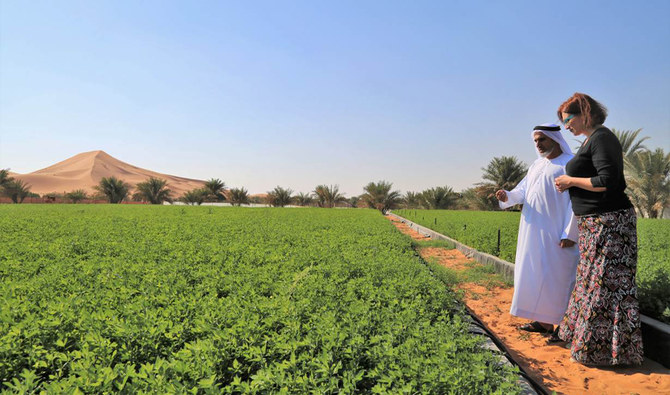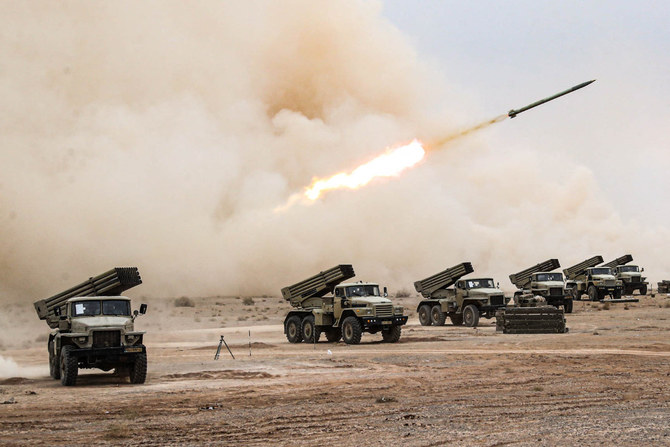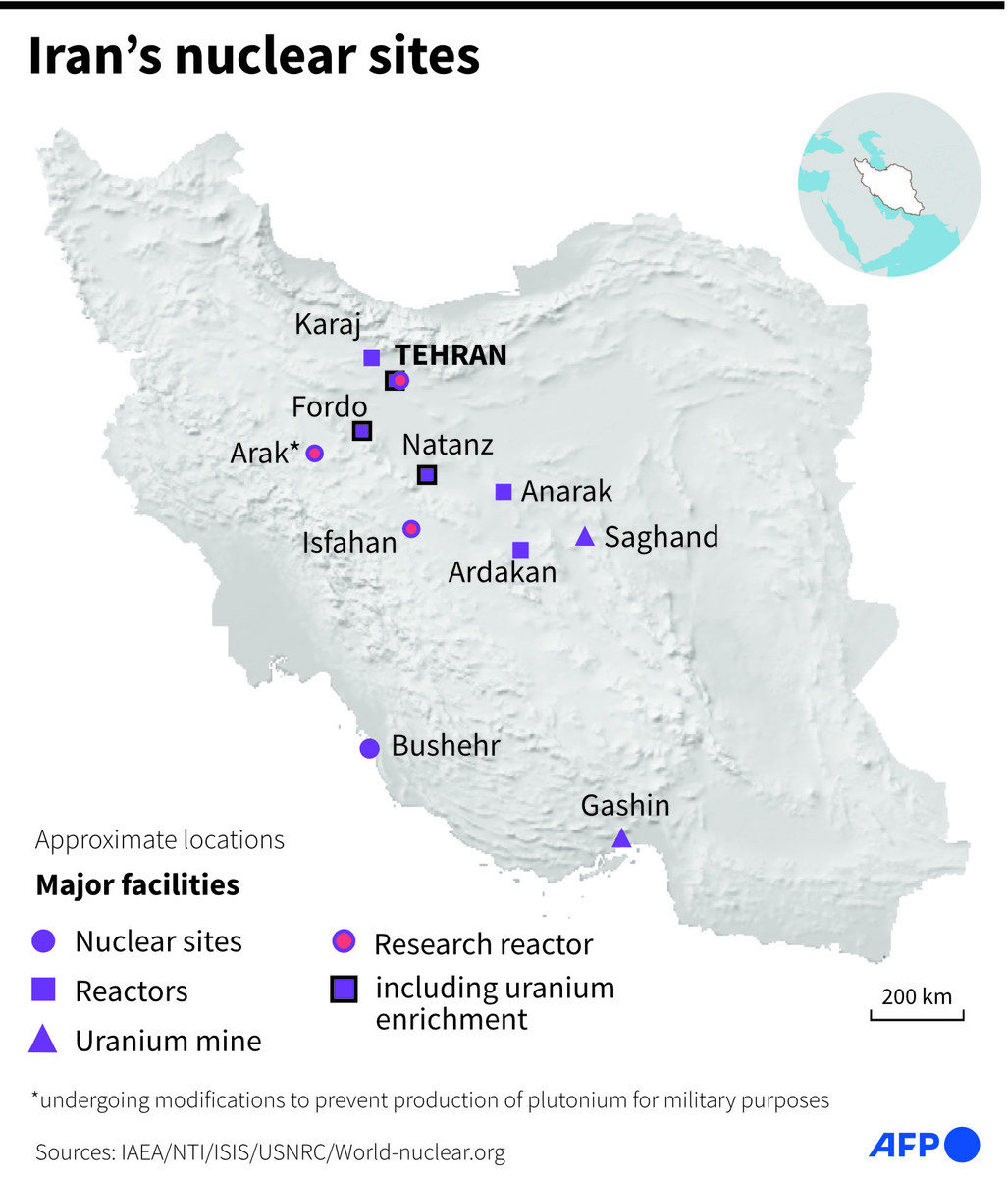ABU DHABI: In the past four years, the United Arab Emirates has grown a small but rising share of its own organic tomatoes, aiming to shore up food security in an import-dependent desert country.
The effort — part of a broader push to produce more home-grown food amid fears climate change could trigger instability in the global food trade — started after the country was hit by food export bans during the 2008-2009 financial crisis.
Today, the move to build up food resilience is paying off early in the face of another crisis: the coronavirus pandemic.
When the United Arab Emirates (UAE) went into lockdown in April to contain the spread of the novel coronavirus, residents had the same reaction as millions of others around the world — they started panic-buying.
The instinct to stock up made sense in a country where more than 80% of food is imported, said Ismahane Elouafi, director general of the International Center for Biosaline Agriculture (ICBA).
Nonetheless supermarket shelves have remained fully stocked, partly because the UAE has long had policies in place to ensure an uninterrupted supply of food from abroad, she noted.
But in the face of the pandemic, the UAE’s confidence that it will continue to have enough food is bolstered by its success in growing its own, using innovations like vertical farming and climate-resilient crops, she added.
“Thanks to the work being done to harness the benefits of innovation, agriculture is becoming possible and profitable in a country with harsh climatic conditions,” Elouafi said.
According to data from the World Bank, the contribution of agriculture to the country’s gross domestic product rose from $2.39 billion in 2012 to $3.06 billion in 2018.
The UAE’s Ministry of Food Security declined to respond to a request for comment.
FARMING WITH FEWER RESOURCES
Currently ranking 21 out of 113 countries on the Economist Intelligence Unit’s Global Food Security Index, the UAE aims to be in the top 10 by 2021 and number one by mid-century.
By then, the federal government hopes half the food Emiratis consume will be produced locally, compared to 20% today.
Under the UAE’s National Food Security Strategy — which was officially launched in 2018, but had already been woven into government policy for several years before — the country has worked to boost domestic food production.
It has built infrastructure, including complexes for cattle-breeding — and introduced financial measures, from exempting value-added tax on food produced on local farms to paying subsidies on fodder.
But traditional farming methods can only go so far in a country with limited supplies of fresh water and arable land.
Last year, the World Resources Institute classified the UAE as under “extremely high water stress,” meaning more than 80% of available surface and groundwater supply is withdrawn on average every year.
The bulk of that water is used by the agricultural sector. Combined with a warming climate and a growing population, this is causing available groundwater levels to drop by 0.5 cm (0.2 inches) per year.
To meet the country’s freshwater needs, the government is increasingly turning to energy-intensive desalination methods.
Another challenge is that less than 1% of the UAE’s land is arable, according to the World Bank.
The focus is on finding ways to farm with fewer resources — which is where technology and experimenting with new crops can help, said Sajid Maqsood, associate professor in the College of Food and Agriculture at United Arab Emirates University.
“Urban and vertical farming has to be an important part of the strategy,” he said by phone.
YEAR-ROUND FRUIT & VEG
Farming in the UAE has been moving in a high-tech direction over the past decade.
In 2009, for example, the Middle Eastern country had 50 hydroponic farms, where plants are grown without soil using nutrient-infused water. Today, it has more than 1,000, according to the ICBA.
Most of the farming innovations gaining ground in the UAE involve growing crops indoors, in an attempt to tackle one of the main challenges facing the region’s farmers: the climate.
Global warming is expected to lead to less rainfall, fiercer droughts, higher sea levels and more storms in the UAE over the next 70 years, a group of climate experts said in a 2019 paper.
By 2050 the country’s average temperature will increase by about 2.5 degrees Celsius (4.5 degrees Fahrenheit), they noted.
“At least four months of the year are not conducive to traditional agriculture — heat, humidity and dust are challenges to farming in the region,” explained Digant Raj Kapoor, people manager at Madar Farms, a local agriculture tech company.
“It means that yields and quality cannot be controlled or predicted. An indoor facility is able to tackle this by having as much control over growing conditions as possible.”
One project, Pure Harvest Smart Farms, has been producing a share of the UAE’s home-grown tomatoes since it launched in 2016, using the country’s first technology-enabled greenhouse.
With its climate-controlled system developed in the Netherlands, the Emirates-based start-up can grow year-round, producing about 2 metric tons of pesticide-free tomatoes each day on its 1-hectare (2.5-acre) proof-of-concept farm.
Pure Harvest plans to diversify into other fruits and vegetables, expanding to 30 hectares in the next few months.
In recent years, the UAE has also seen a rise in the number of vertical farms, in which crops are grown stacked under LED lighting and watered with mists or drip systems.
In Dubai, the country’s business and tourism hub, airline catering service Emirates Flight Catering and vertical farm operator Crop One Holdings have launched a $40-million joint venture to build the world’s largest vertical farm.
Crop One Holdings says the 130,000 square-foot (12,077 sq m) farm — due to be completed this year — will produce 6,000 pounds (2,721 kg) of pesticide- and herbicide-free fruits and vegetables daily, using 99% less water than traditional farms.
Branching out into new crops is key to the UAE’s quest to become self-sustaining, said the ICBA’s Elouafi.
The Dubai-based ICBA works with local ministries, farmers’ associations and businesses to introduce climate-resilient crops such as quinoa, pearl millet and sorghum to farmers, she added.
“The global food production system is currently dominated by just a few staple crops — this needs to change,” she said.
For Kapoor at Madar Farms, which has been growing leafy greens and microgreens in vertical systems since 2017, the move into tech-enabled agriculture is inevitable to deal with challenges like climate change and the novel coronavirus.
“The world will have to shift toward controlled-environment agriculture,” he said.
($1 = 3.6728 UAE dirham) (Reporting by Rabiya Jaffery; editing by Jumana Farouky and Megan Rowling. Please credit the Thomson Reuters Foundation, the charitable arm of Thomson Reuters, that covers the lives of people around the world who struggle to live freely or fairly.






















